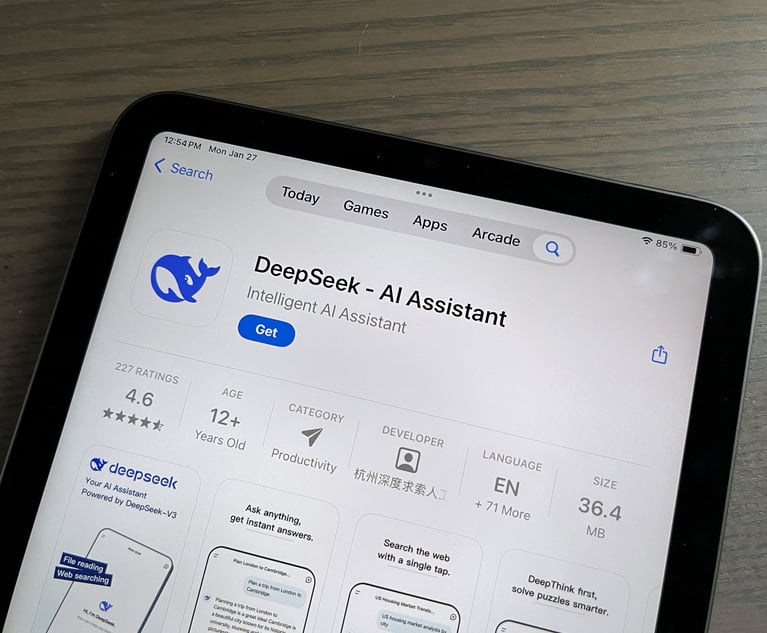US Efforts to Chill Chinese IPOs Could Be a Burden for Big Law
U.S. listings work is one of the few areas where U.S. law firms still have something close to a monopoly when it comes to Chinese clients.
June 04, 2020 at 01:00 AM
4 minute read
The original version of this story was published on The American Lawyer
 Chairman Jay Clayton during an open meeting of the U.S. Securities and Exchange Commission, on June 5, 2019. Photo: Diego M. Radzinschi/ALM
Chairman Jay Clayton during an open meeting of the U.S. Securities and Exchange Commission, on June 5, 2019. Photo: Diego M. Radzinschi/ALM
In late April, U.S. Securities and Exchange Commission chair Jay Clayton and William Duhnke, chair of the Public Company Accounting Oversight Board, issued a joint statement warning investors of the risks of investing in companies from emerging markets. Although the document wasn't specific, it's clear that the duo are really concerned about one particular emerging market: China.
The day after releasing the statement, Clayton, who before being appointed by President Donald Trump to run the SEC was a longtime Sullivan & Cromwell partner and advised on the largest-ever U.S. initial public offering from China, Alibaba's 2014 listing, went on Fox Business to reiterate the warning, stressing in particular that the oversight board's inability to monitor Chinese companies' books compounds the risk.
China is currently the only jurisdiction refusing to subject its companies' accounting records to the board's oversight. Last year, a bipartisan bill dubbed the Equitable Act, sponsored by Republican senator and longtime China hawk Marco Rubio, was put before Congress. It would delist companies that refuse to let the board review their financial statements. China currently says Chinese companies' financial records are state secrets and are prohibited from leaving the country.
All this went from a rather abstract threat—Chinese companies have gained significant momentum from U.S. investors since Alibaba's blockbuster IPO—to a tangible risk in April when NASDAQ-listed Luckin Coffee admitted to fabricating $310 million worth of sales in 2019. The fraud couldn't have come at a worse time. Not only are U.S.-China relations facing challenges in trade, technology and other economic realms, but the coronavirus pandemic that initially broke out in China is further straining what is already a deteriorating relationship.
It is unclear now how soon U.S.-listed Chinese companies will facing the threat of being delisted. There are currently over 150 Chinese companies listed on U.S. exchanges; many of them went public with the help of major U.S. banks. But the immediate impact of the Luckin fraud and the administration's distrust of Chinese entities is likely to be destructive to U.S. listings from China.
U.S. listings work is one of the few areas where U.S. law firms still have something close to a monopoly when it comes to Chinese clients. Naturally, the work is more lucrative than Hong Kong listings, which are much more competitive and for which firms are subject to a capped fee. The five years since 2014, when Alibaba listed on the New York Stock Exchange, saw a surge of Chinese listings in the U.S.—more than two-thirds of U.S.-listed Chinese companies went public during that period. Each of 2018 and 2019 had more than 30 Chinese issuers listed on U.S. exchanges.
And the legal work of these listings was carried out by an incredible concentration of elite firms. Seven firms—Simpson Thacher & Bartlett; Latham & Watkins; Skadden, Arps, Slate, Meagher & Flom; Kirkland & Ellis; Davis Polk & Wardwell; Cleary Gottlieb Steen & Hamilton; and Wilson Sonsini Goodrich & Rosati—held 83% of U.S. counsel roles for the 32 Chinese listings in 2018. Last year, that group plus O'Melveny & Myers landed 58% of U.S. counsel roles for all listings from China. Skadden alone worked on 25 such listings in 2018 and 2019, followed by Davis Polk at 17 and Simpson Thacher at 15.
Lawyers and investors alike share a gloomy outlook for Chinese IPOs in the U.S. this year, especially after Clayton's television warning. Alibaba's secondary listing in Hong Kong last year gave some hope; more companies are expected to follow suit. But that group is small. Fewer than two dozen companies currently qualify for a secondary Hong Kong listing.
There are still Chinese companies seeking to list in the U.S.—two filed applications as recently as April, and Kirkland, Wilson Sonsini and Davis Polk are advising. Individual listings may still be successful, but for those firms and others like them, the next wave may be a long way off.
Email: [email protected]
This content has been archived. It is available through our partners, LexisNexis® and Bloomberg Law.
To view this content, please continue to their sites.
Not a Lexis Subscriber?
Subscribe Now
Not a Bloomberg Law Subscriber?
Subscribe Now
NOT FOR REPRINT
© 2025 ALM Global, LLC, All Rights Reserved. Request academic re-use from www.copyright.com. All other uses, submit a request to [email protected]. For more information visit Asset & Logo Licensing.
You Might Like
View All
Eighth Circuit Determines No Standing for Website User Concerned With Privacy Who Challenged Session-Replay Technology
7 minute read
The Time Is Now for Employers to Assess Risk of Employees’ Use of DeepSeek
4 minute read
Fired by Trump, EEOC's First Blind GC Lands at Nonprofit Targeting Abuses of Power
3 minute read
Houston Law Firm Files $250K Breach of Contract Suit Against 2 Former Lawyers
3 minute readLaw Firms Mentioned
Trending Stories
- 1Lack of Jurisdiction Dooms Child Sex Abuse Claim Against Archdiocese of Philadelphia, says NJ Supreme Court
- 2DC Lawsuits Seek to Prevent Mass Firings and Public Naming of FBI Agents
- 3Growth of California Firms Exceeded Expectations, Survey of Managing Partners Says
- 4Blank Rome Adds Life Sciences Trio From Reed Smith
- 5Divided State Supreme Court Clears the Way for Child Sexual Abuse Cases Against Church, Schools
Who Got The Work
J. Brugh Lower of Gibbons has entered an appearance for industrial equipment supplier Devco Corporation in a pending trademark infringement lawsuit. The suit, accusing the defendant of selling knock-off Graco products, was filed Dec. 18 in New Jersey District Court by Rivkin Radler on behalf of Graco Inc. and Graco Minnesota. The case, assigned to U.S. District Judge Zahid N. Quraishi, is 3:24-cv-11294, Graco Inc. et al v. Devco Corporation.
Who Got The Work
Rebecca Maller-Stein and Kent A. Yalowitz of Arnold & Porter Kaye Scholer have entered their appearances for Hanaco Venture Capital and its executives, Lior Prosor and David Frankel, in a pending securities lawsuit. The action, filed on Dec. 24 in New York Southern District Court by Zell, Aron & Co. on behalf of Goldeneye Advisors, accuses the defendants of negligently and fraudulently managing the plaintiff's $1 million investment. The case, assigned to U.S. District Judge Vernon S. Broderick, is 1:24-cv-09918, Goldeneye Advisors, LLC v. Hanaco Venture Capital, Ltd. et al.
Who Got The Work
Attorneys from A&O Shearman has stepped in as defense counsel for Toronto-Dominion Bank and other defendants in a pending securities class action. The suit, filed Dec. 11 in New York Southern District Court by Bleichmar Fonti & Auld, accuses the defendants of concealing the bank's 'pervasive' deficiencies in regards to its compliance with the Bank Secrecy Act and the quality of its anti-money laundering controls. The case, assigned to U.S. District Judge Arun Subramanian, is 1:24-cv-09445, Gonzalez v. The Toronto-Dominion Bank et al.
Who Got The Work
Crown Castle International, a Pennsylvania company providing shared communications infrastructure, has turned to Luke D. Wolf of Gordon Rees Scully Mansukhani to fend off a pending breach-of-contract lawsuit. The court action, filed Nov. 25 in Michigan Eastern District Court by Hooper Hathaway PC on behalf of The Town Residences LLC, accuses Crown Castle of failing to transfer approximately $30,000 in utility payments from T-Mobile in breach of a roof-top lease and assignment agreement. The case, assigned to U.S. District Judge Susan K. Declercq, is 2:24-cv-13131, The Town Residences LLC v. T-Mobile US, Inc. et al.
Who Got The Work
Wilfred P. Coronato and Daniel M. Schwartz of McCarter & English have stepped in as defense counsel to Electrolux Home Products Inc. in a pending product liability lawsuit. The court action, filed Nov. 26 in New York Eastern District Court by Poulos Lopiccolo PC and Nagel Rice LLP on behalf of David Stern, alleges that the defendant's refrigerators’ drawers and shelving repeatedly break and fall apart within months after purchase. The case, assigned to U.S. District Judge Joan M. Azrack, is 2:24-cv-08204, Stern v. Electrolux Home Products, Inc.
Featured Firms
Law Offices of Gary Martin Hays & Associates, P.C.
(470) 294-1674
Law Offices of Mark E. Salomone
(857) 444-6468
Smith & Hassler
(713) 739-1250








